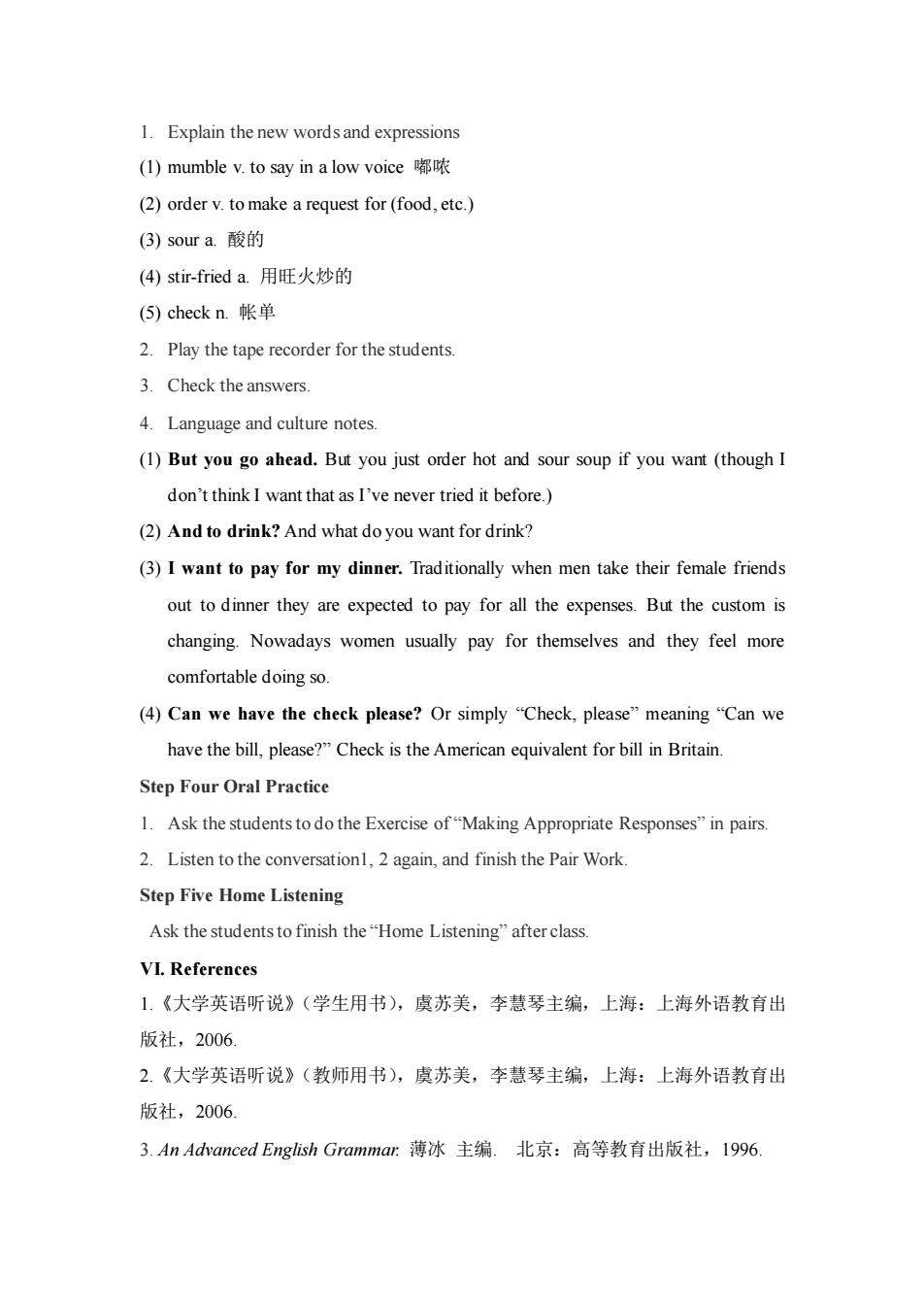
Unit 11 Dining Out(I) I.Teaching Aims 1.Master the useful expressions in this unit. 2.Train the students'listening ability to understand the main idea and grasp important details ofa text 3.Give a brief summary to the conversations of having meals in the restaurant. 4.Improve the student's speaking ability related to dining out. II.Teaching Points 1.Ss are required to understand the conversations related todining out 2.Train the students'listening and speaking abilities. 3.Useful expressions and words:mumble.order.sour,stir-fried.check III.Teaching Methods 1.Listening and speaking activities 2.Individual,pair,or group work 3.Role-play activities 4.Explanation IV.Teaching Periods Two teaching hours V.Teaching procedures Step one Introduction Lead in to the text by asking a question -"What kind of food do you like?" Step Two Micro-listening 1.Play the tape recorder for the students and ask the student pay attention to the names of food. 2.Check the answers Step Three Macro-listening
Unit 11 Dining Out (I) I. Teaching Aims 1. Master the useful expressions in this unit. 2. Train the students’ listening ability to understand the main idea and grasp important details of a text; 3. Give a brief summary to the conversations of having meals in the restaurant. 4. Improve the student’s speaking ability related to dining out. II. Teaching Points 1. Ss are required to understand the conversations related to dining out. 2. Train the students’ listening and speaking abilities. 3. Useful expressions and words: mumble, order, sour, stir-fried, check III. Teaching Methods 1. Listening and speaking activities 2. Individual, pair, or group work 3. Role-play activities 4. Explanation IV. Teaching Periods Two teaching hours Ⅴ. Teaching procedures Step one Introduction Lead in to the text by asking a question —“What kind of food do you like?” Step Two Micro-listening 1. Play the tape recorder for the students and ask the student pay attention to the names of food. 2. Check the answers. Step Three Macro-listening

1.Explain the new wordsand expressions (1)mumble v.to say in a low voice嘟哝 (2)order v.to make a request for(food,etc.) (3)sour a.酸的 (4)stir-fried a.用旺火炒的 (⑤)check n.帐单 2.Play the tape recorder for the students 3.Check the answers. 4.Language and culture notes (1)But you go ahead.But you just order hot and sour soup if you want(thoughI don't think I want that as I've never tried it before.) (2)And to drink?And what do you want for drink? ()I want to pay for my dinner.Traditionally when men take their female friends out to dinner they are expected to pay for all the expenses.But the custom is changing.Nowadays women usually pay for themselves and they feel more comfortable doing so. (4)Can we have the check please?Or simply "Check,please"meaning"Can we have the bill,please?"Check is the American equivalent for bill in Britain Step Four Oral Practice 1.Ask the students todo the Exercise of"Making Appropriate Responses"in pairs. 2.Listen to the conversationl,2 again,and finish the Pair Work Step Five Home Listening Ask the studentsto finish the"Home Listening"afterclass. VI.References 1.《大学英语听说》(学生用书),虞苏美,李慧琴主编,上海:上海外语教育出 版社,2006. 2.《大学英语听说》(教师用书),虞苏美,李慧琴主编,上海:上海外语教有出 版社,2006. 3.An Advanced English Grammar:薄冰主编.北京:高等教育出版社,1996
1. Explain the new words and expressions (1) mumble v. to say in a low voice 嘟哝 (2) order v. to make a request for (food, etc.) (3) sour a. 酸的 (4) stir-fried a. 用旺火炒的 (5) check n. 帐单 2. Play the tape recorder for the students. 3. Check the answers. 4. Language and culture notes. (1) But you go ahead. But you just order hot and sour soup if you want (though I don’t think I want that as I’ve never tried it before.) (2) And to drink? And what do you want for drink? (3) I want to pay for my dinner. Traditionally when men take their female friends out to dinner they are expected to pay for all the expenses. But the custom is changing. Nowadays women usually pay for themselves and they feel more comfortable doing so. (4) Can we have the check please? Or simply “Check, please” meaning “Can we have the bill, please?” Check is the American equivalent for bill in Britain. Step Four Oral Practice 1. Ask the students to do the Exercise of “Making Appropriate Responses” in pairs. 2. Listen to the conversation1, 2 again, and finish the Pair Work. Step Five Home Listening Ask the students to finish the “Home Listening” after class. VI. References 1.《大学英语听说》(学生用书),虞苏美,李慧琴主编,上海:上海外语教育出 版社,2006. 2.《大学英语听说》(教师用书),虞苏美,李慧琴主编,上海:上海外语教育出 版社,2006. 3. An Advanced English Grammar. 薄冰 主编. 北京:高等教育出版社,1996

4.牛津高阶英汉双解词典(第六版).牛津大学出版社,2004
4. 牛津高阶英汉双解词典(第六版). 牛津大学出版社,2004